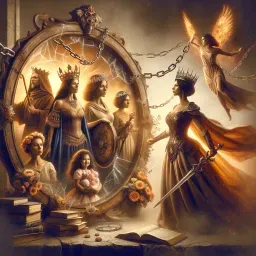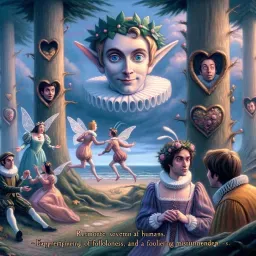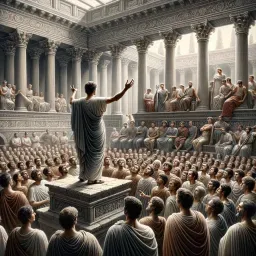But, for my own part, it was Greek to me

0
0
0
0
- Meaning
- "But, for my own part, it was Greek to me" means that something is completely incomprehensible or unintelligible to the speaker. In the context of "Julius Caesar," Casca uses the phrase to describe his inability to understand Cicero's speech, which was delivered in Greek.
- Allegory
- The person standing perplexed symbolizes any individual encountering confusion. The blackboard filled with symbols and Greek equations visualizes the concept of incomprehension. The ancient Greek temple in the background serves as a nod to the origin of the phrase. Modern elements like books and computers subtly incorporated into the image represent the ongoing journey to bridge classical knowledge with contemporary understanding.
- Applicability
- This phrase can be used in daily situations where someone encounters something that is utterly confusing or beyond their understanding, such as complicated jargon, technical documentation, or an unfamiliar language.
- Impact
- This phrase has entered common parlance to describe situations where something is not understood. Its use has permeated various aspects of culture, particularly in English-speaking countries, to signify befuddlement or mystification.
- Historical Context
- The phrase originated during the Renaissance period, a time of great intellectual and cultural advancement. Shakespeare penned "Julius Caesar" around 1599. At that time, the educated elite commonly used Latin and Greek, making those languages symbols of erudition.
- Criticisms
- While the phrase is widely accepted, some critics argue that using historical language out of its original context can sometimes obscure rather than clarify communication.
- Variations
- Variations of this phrase such as "It's all Greek to me" have surfaced in modern usage. The phrase can be found in multiple languages, each using a different foreign language to convey the same sense of incomprehension, such as the French expression "C'est du chinois pour moi" (It’s Chinese to me).
-

The golden age is before us, not behind us.
-

Brevity is the soul of wit.
-

Frailty, thy name is woman!
-

Qui nescit tacere, nescit loqui.
-

My tongue will tell the anger of my heart, or else my heart concealing it will break.
-

O brave new world, that has such people in't!
-

Lord, what fools these mortals be!
-

Friends, Romans, countrymen, lend me your ears.
-

The better part of valor is discretion.
-

Out, out brief candle!
-

O, had I but followed the arts!
-

When sorrows come, they come not single spies, but in battalions.
No Comments